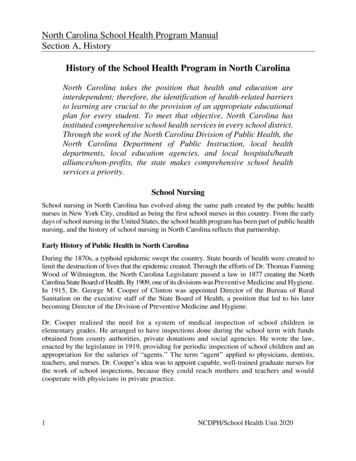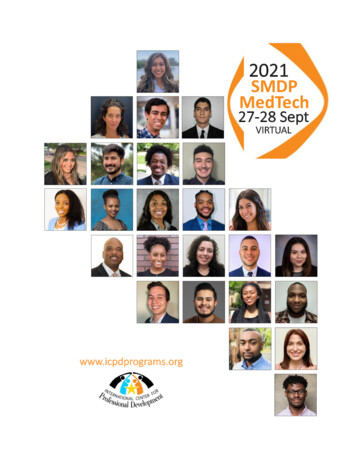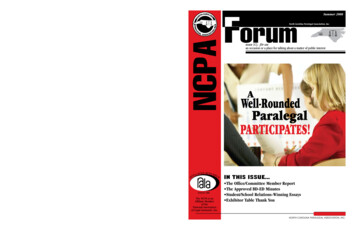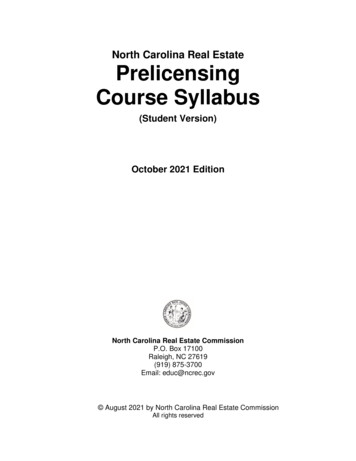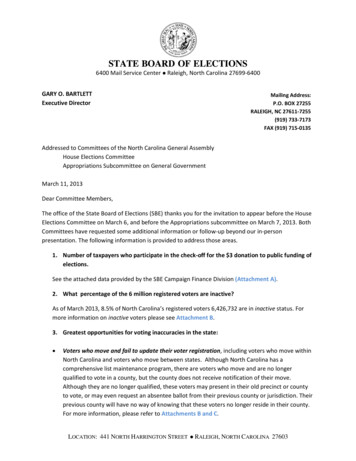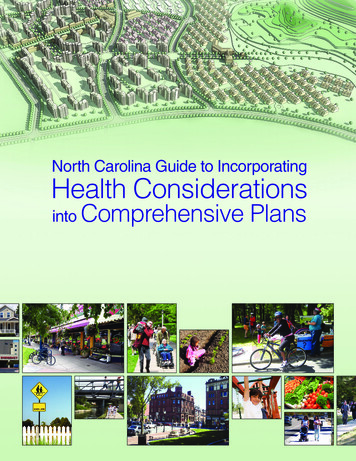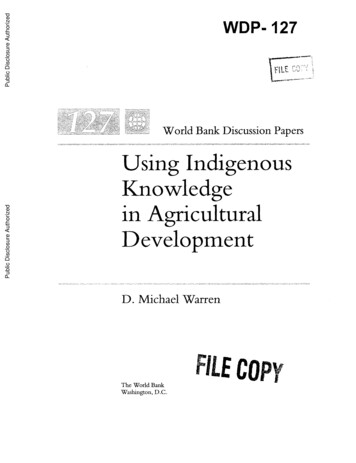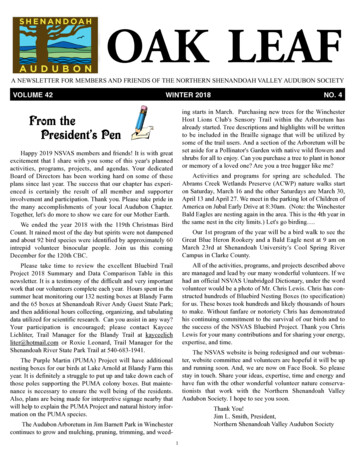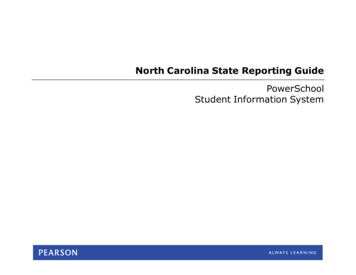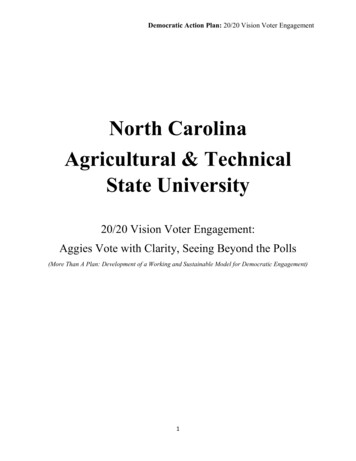
Transcription
Democratic Action Plan: 20/20 Vision Voter EngagementNorth CarolinaAgricultural & TechnicalState University20/20 Vision Voter Engagement:Aggies Vote with Clarity, Seeing Beyond the Polls(More Than A Plan: Development of a Working and Sustainable Model for Democratic Engagement)1
Democratic Action Plan: 20/20 Vision Voter EngagementI. The Executive SummaryNorth Carolina Agricultural and Technological State University (NC A&T State University) is apublic, coeducational, historically black, doctoral research university located in Greensboro, NorthCarolina. As an 1890 public land grant university, community enrichment and civic engagement isingrained in our rich history and further impressed in the mission, vision and strategic goals. The20/20 Vision Voter Engagement Plan: Aggies Vote with Clarity, Seeing Beyond the Polls lays abaseline foundation for the NC A&T State University Student Democratic Engagement Action Plan(DEAP) Model. Over the next few years, NC A&T State will continue to build upon this plan withthe intent of developing a working and sustainable blueprint that continues to increase studentparticipation in the democratic process.The plan employs a multidimensional multiphase paradigm to enhance systems, programs,partnerships, cultural pride and responsibility. 20/20 Vision Voter Engagement is a combination ofsupport, advocacy, education, and empowerment that incorporates cross-campus collaboration,interdepartmental alliances and community partnerships. The plan promotes democratic engagementacross diverse disciplines and interest. It engages students, faculty, staff and administrator inmeaningful political conversations and instills electoral engagement as a priority throughout thecampus community and beyond district lines.While the 20/20 Vision Voter Engagement Plan relies heavily on a student driven approach, it issteered and supported by the Office of Student Development, the Office of the Chancellor and theOffice of Student Activities and Campus Involvement. Additionally, there is a greater work groupinclusive of students, faculty and staff across campus and various nonpartisan community partners.This work group helps to inform the continued development of the plan, bridges gaps through thespirit of collaboration, connect students civically to the greater Greensboro community, andreinforces a system of support for campus democratic work.20/20 Vision Voter Engagement is influenced by the data from both the 2012/ 2016 and the 2014/2018 National Study of Learning, Voting and Engagement (NSLVE) reports; as well as anassessment of previous programmatic efforts, systemic opportunities and student needs. Theframework of the plan is designed with four strategic cornerstones and five programmatic focal areas.In preparation for the 2020 General Elections, a few components of the plan was previewed in fall2019 on campus. The first cycle of the 20/20 Vision Voter Engagement Plan was initiated January2020 and will be effective through December 2020. However, the development of the DEAP willextend beyond this election season.2
Democratic Action Plan: 20/20 Vision Voter Engagement20/20 Vision Voter Engagement PlanNorth Carolina A&T State UniversityVision" where high-achieving scholars are in engaged in transformative teaching and learning, civic outreach, interdisciplinaryresearch and innovative solutions to global challenges."Mission" advances knowledge through scholarly exchange and transforms society with teaching, learning, discovery andcommunity engagement. " innovative solutions that address the challenges and economic needs of North Carolina, thenation and the world."StrategicPlanStrategicGoalsA&T Preeminence: Taking Momentum to 2023Commitment excellence to Student SuccessCultivate an intellectual climate that encourages the creative exchange of ideasElevate and expand public service and community VENESSLEARNINGCoreValuesNC A&T Democratic Engagement Action PlanDemocratic More Than A Plan:EngagementAction PlanDEAP 2020/20 Vision VoterEngagement:Development of a Working and Sustainable Model for Democratic EngagementAggies Vote with Clarity, Seeing Beyond the PollsDEAP Vision A campus political climate where students take pride in being civically engaged and responsible citizens.DEAP Mission Foster a culture that results in increased democratic participation by informed and empowered studentsInstitutionalization(Systemic Integration& ive, Intentional & Adaptable)Culture(Pride & Responsibility)Partnerships(Strong & Sustainable)Voter RegistrationVoter EducationProgrammatic Voter ExcitementGet Out the VoteFocal AreasCivic Learning &EngagementDEAP Programmatic PhasesDEAP Strategic ImplementationElection SeasonPresidentialOff YearMid-TermPhase 1Planning &Preparation(March- July)Planning &Preparation(March- July)Planning & Preparation(March- July)Phase 2VoterVoter RegistrationRegistration (Aug(Aug- Sept)Sept)Voter Registration(Aug- Sept)Phase 3Voter Education(Sept- Oct)Voter Education &Civic Engagement(Sept- Oct)Voter Education(Sept- Oct)Phase 4Voter Excitement(Oct)Voter Excitement(Oct)Phase 5Get Out the Vote(Oct- Nov)Voter Excitement(Oct)If ApplicableGet Out the Vote(Oct- Nov)If ApplicablePhase 6Civic Learning &Engagement(Jan- April)Voter Registration,Education, Get Outthe Vote(Feb- March)Civic Learning &Engagement(Jan- April)3Get Out the Vote(Oct- Nov)Democratic EngagementCoalition(Aug- July)
Democratic Action Plan: 20/20 Vision Voter EngagementII. LeadershipCo-ChairsMs. Tiffany SeawrightDirector of Leadership and EngagementOffice of Student Development(Advisor to the Fellows/Ambassadors)Mr. Ray TrappDirector of External AffairsOffice of the Chancellor(University/ Community Liaison)Student LeadershipMs. Brenda CaldwellPresident of the Student Government Association, Office of Student Activities and CampusInvolvementMr. Cole RileyPresident of the SGA Political Action Committee; Campus Vote Project Democracy Fellow(Ex-Officio Student Member Appointed by Student Government Association)Ms. Aigne TaylorCampus Election Engagement Project (CEEP) Fellow; Campus Vote Project Democracy Fellow;President of the Junior ClassMs. Arianna HopkinsCampus Vote Project Democracy FellowMr. Bryan DayeAndrew Goodman Ambassador (tentative)Mr. Brandon DayeAndrew Goodman Ambassador (tentative)Fellows/ Ambassadors work hand-in-hand to organize campus-wide civic learning and democraticengagement opportunities for their peers. They are charged with keeping the student body informedwith current voter information as well as developing “street teams” and meaningful alliances acrosscampus. They work closely with the Office of Student Development and SGA’s Political ActionCommittee to coordinate voter engagement collaborations and event calendars.Democratic Engagement Coalition (DEC)The 2020 coalition was expanded with invites to various stakeholders on and off-campus. Theobjective of the coalition is to unite students, faculty, staff, alumni and community organizations withmutual vest interest in student democratic engagement. The coalition operates in the manner of anadvisory board; providing direction for coordinated synergism and support of strategic initiatives toincrease voter turnout of informed and empowered students. This year a subcommittee wasdeveloped to create commemorative programs that bring awareness to the 100th Anniversary of the19th Amendment. Both work groups are charged with programmatic thrust that include education4
Democratic Action Plan: 20/20 Vision Voter Engagement(rights and responsibilities), awareness, registration and increased poll turnout. These work groupsare vital to the success of the multifaceted approach outlined in the DEAP. They develop actioninitiatives that foster expanding the political lens past placing a ballot. The coalition meets monthlyand those dates are determined by the members.Invites extended to the following campusconstituents Student Government Association Greek Life Student Union Activities Board Residence Hall Association Housing & Residence Life Multicultural Affairs Academic Affairs Faculty Senate Staff Senate Community Partners University Relations Office of External Affairs Office of Student Development Council of Presidents NAACP History & Political Science (Dept. &Club) Office of University CommunityEngagement Etc.Invites extended to the following communityconstituents Common Cause Color of Change Democracy NC You Can Vote Campus Vote Project/ NASPA VoterFriendly Campus Ask Every Student League of Woman Voters, NC Campus Compact Campus Election Engagement Project When We All Vote TurboVote Black Girl Vote League of Women Voters National Conference on Citizenship MediaWise Project Andrew Goodman Foundation The Black Alliance Board of Elections Etc.5
Democratic Action Plan: 20/20 Vision Voter EngagementIII. CommitmentNCAT Vision“North Carolina Agricultural and Technical State University is a preeminent land-grantinstitution where high-achieving scholars are engaged in transformative teachingand learning, civic outreach, interdisciplinary research andinnovative solutions to global challenges.” –NCAT Mission“North Carolina Agricultural and Technical State University advances knowledge throughscholarly exchange and transforms society with exceptional teaching,learning, discovery and community engagement. An 1890 land-grantdoctoral research institution with a distinction in STEM and commitment to excellence in alldisciplines, North Carolina A&T creates innovative solutions that address thechallenges and economic needs of North Carolina, the nation andthe world.”NCAT Core ValuesResponsibility. Excellence. Integrity. Inclusiveness. Learning.NC A&T State University, a Carnegie Classification for Community Engagement higher educationinstitution, echoes its commitment and responsibility to civic learning, discovery and engagementthrough various internal and external messaging. The University’s mission is to transform society byfostering a campus environment that nurtures the development of local, national and/or globallyconcerned and involved citizens. The spirit of this commitment is rooted in the university’sreputation and sown in the fabric of the institution’s brand. Students, faculty and staff are called toserve, develop partnerships, conduct research and strengthen the university’s presence in thecommunity and at the polls. In recent years, civic learning and student democratic engagement havebecome an institutional priority; reinforced the Board of Trustees, the Chancellor and the Cabinetthrough the Strategic Plan and the development of the Democratic Engagement Coalition.NCAT Strategic PlanPreeminence 2023: Taking the Momentum, outlines NC A&T State University’s strategic initiativesand gives guiding principles by which the plan is rooted. The core values are Responsibility,Excellence, Integrity, Inclusiveness and Learning; which are the standard principles for planning andexecution of the 20/20 Vision Voter Engagement plan. The strategic goals give direction to the voterengagement goals.Goal 1: Commitment excellence to Student Success (Informed and empowered studentvoters)6
Democratic Action Plan: 20/20 Vision Voter EngagementGoal 2: Cultivate an intellectual climate that encourages the creative exchange of ideas(voter education and awareness)Goal 3: Elevate and expand public service and community engagement (Increased civiclearning, engagement and voter turnout)NCAT Democratic Engagement InfrastructureIn 2016, the Civic Engagement Committee was developed to enhance the voter engagement at NCA&T State University. In 2020, the committee was renamed as the Democratic EngagementCoalition (DEC). The DEC is organized by Office of Student Development, the Office of theChancellor and the Student Government Association to continue to develop strong communitypartnerships, strengthen cross-campus collaborations and magnify programmatic impact. Thecoalition further seeks to expound upon the knowledge, resources and expertise that informs themultifaceted implementation strategies of the 20/20 Vision Voter Engagement plan and continueddevelopment of the DEAP model.The Office of External Affairs- Co-chairs the coalition; leads the University’s advocacy andlegislative outreach efforts; keeps the coalition abreast of legislative decisions affecting thepolitical climate on campus; the liaison for the Chancellor’s Office on the coalitionThe Office of Student Development- Co-chairs the coalition; advises the interns, fellowsand/or ambassadors; coordinates the coalition meetings and keeps track of campus voterengagement efforts; report accordingly; facilitate the development of the DEAP; the liaisonfor the Office of Student Affairs on the coalition; supervises the Coordinator of CivicEngagement and Service LearningThe plan involves an infrastructure that relies profoundly on the work of our students. There are twostudent steering committees for voter engagement:SGA Political Action Committee (PAC)- under the directive of SGA, PAC works withvarious student organization, the Office of Student Activities and Campus Involvement, theOffice of Student Development and community partners to provide a robust campus-widevoter engagement agendaThe Fellows- under the advisement of the Director of Leadership and Engagement, variouscommunity partners employ NC A&T State University student interns, fellows orambassadors to work closely with the university in a liaising capacity; tasked withdeveloping and implementing of intentional engagement plans that register student and GetOut the VoteIn an effort to make voter education salient across campus, DEC has set some internal goals: Develop the Democratic Engagement Action Plan Model (establishing a solid presence of thefour essential cornerstones of Institutionalization, Programming, Culture and Partnership) Strengthening communication efforts and telling the story of voter and civic engagementefforts Increase visibility on campus (through registration, education, excitement, poll participation,and continue democratic engagement)7
Democratic Action Plan: 20/20 Vision Voter Engagement Establishing an Inventory system that tracks campus-wide engagementIncrease voter registration and voter participation at the pollsEngagement & HighlightsFall 2019Voter registration is a major component of the plan. The committee utilizes an aggressive voterregistration strategy. Registration is completed on a regular and continuous basis throughout the yearby various groups at numerous events. The Student Government Association’s Political ActionCommittee (PAC) spearheads the training of volunteers and student groups. In preparation for theupcoming election season, NC A&T State University has already had a very productive 2019 fallsemester in the area of political engagement. In a span of just over two month (September 11thNovember 20th), the university has completed over 12 events with over 32 engagements campuswide. Highlights include:Voter registration trainings: Over 45 student volunteers trained to assist PACAll Resident Assistants and Peer Academic Leaders (over 150 students)Student Senate and Class Officers Association trained at their retreatStudent Union Activities Board, the NAACP and various academic organizationsVoter registration on campus: Voter registration in freshman Biology classes, freshman studies classes, and organizations’full body meetings (upon request)National Voter Registration Day event (648 registrations)Voter registration every 2nd and 4th Tuesday of the month with the Beta Epsilon chapter ofAlpha Phi Alpha Fraternity, Incorporated for their Voteless People is a Hopeless PeopleinitiativeFall PAC Week (daily registration)Dorm Storm tour (every residence hall, every door knocked on to register students to vote)Every Mister A&T for Dapper DaysPresidential Debate Watch PartyOther voter engagement highlights: Bus of students attended Board of Elections meetings (requesting an early voting site oncampus)County Board of Elections decided 3-2 to grant NC A&T in favor of early voting siteStudents attended NC College Voter SummitFall Political Action Week (Reparations event, voter registration tables, political trivia &pizza, fireside chat about the census and gerrymandering, and a community organization fair)Presidential Debate Watch Party8
Democratic Action Plan: 20/20 Vision Voter Engagement Ice Cream Kickback Q&ASpring 2020Get the Vote (Primaries) Real Aggies Campaign (a pushing student voters to the polls and stressing the importance ofvoting how that it is a part of what AggiesDo!)Poll Pals Sign-upsSoul & the Polls (Gospel DJ, fellowship, voter education and encouragementBallot Made Simple Session #BallotBusiness (Dissecting the ballot for each party/ candidateeducation, Step-by-step poll guide, Fill out sample ballots to take to the polls)Hall Crawl Week Tour (Partnership with RHA- canvassing on the importance of voting, earlyvoting site and educating on what’s on the ballot, “Ballot Made Simple” in the lobbies, allowstudents to fill out sample ballots).Joint Greek Council (Video competition)Lunch at the Polls (invite Faculty/ Staff, Food Trucks at the poll)FAQs flyerAthletics announcements Basketball GamesVoter Engagement Highlights for the Year Over 3000 plus students were engaged through programs and events hosted by studentleaders and volunteers (i.e. tabling sessions, activism, dorm storms, etc.). 1181 New residential students registered to vote (46% increase from the previous year)The History and Political Science department and club in addition to Color of Change, You CanVote, Democracy NC, Common Cause, Campus Elections Engagement Project, NC CampusCompact and the League of Women Voters have historically proven to be very effective partnershipsthat strengthen the integrity of the political engagement work on campus.IV. LandscapeThe National Study of Learning, Voting and Engagement (NSLVE) Report20/20 Vision Voter Engagement is informed by the National Study of Learning, Voting andEngagement report. NC A&T State University is one of 1000s of colleges and universities thatparticipates in the NSLVE study. The NSLVE is an initiative by the Institute for Democracy andHigher Education at Tufts University’s Jonathan M. Tisch College of Civic Life aimed to providecampuses with their institutional data (student voter registration and voting rates). The research is9
Democratic Action Plan: 20/20 Vision Voter Engagementintended to assist institutions in creating strategies that increase student participation in thedemocratic process.While the NSLVE report issued September 2019, indicated that NC A&T State University increasedstudent voter rate by 7.6 percent in the 2018 Midterm Elections (compared to 2014), the universitystill has much work to do. The voting rate fell 10.1 percent short of the average student votingamongst all participating institutions.NC A&T State UniversityBrief SummaryNumber of students who registeredNumber of students who votedVoting rate of registered studentsVoting rateElection Year20142018 Change69278126( 1198)20923241( 1149)30.20% 39.90% ( 9.7)21.20% 29.00% ( 7.8)Challenge areasIn-person voting method on Election DayDifference from all .3)Additional NSLVE data that impacts the strategic directive of the plan is the 2016 report outliningthe results of the Presidential Election (2012 and 2016 data analysis/ comparison). Due to a numberof factors, NC A&T State University saw a devastating decline of 16.1 percent voter turnout rate in2016 (43.2%) compared to 2012 (59.7%). Notably, these percentages are catalyst that direct the planof action and current political engagement work on campus.Based on the NSLVE data, NC A&T State University was awarded the Bronze placement in the AllIn Challenge.ChallengesReasons Why Students Don’t Vote (based on a survey from the Spring 2020 Primaries): Registered in their hometown (students go home to vote)Do not think that local elections affect themUnaware on how to voteDid not know about the early polling siteDon’t know the issues and how they are affected“Trump is going to win anyway”“My vote doesn’t matter due to the Electoral College”“I don’t know who to vote for”“It’s intimidating”10
Democratic Action Plan: 20/20 Vision Voter Engagement “I hate politics”“I don’t care”“I registered to get the t-shirt”“I’ll do it later”“Are we voting on presidents?”“My mom wants me to stay registered at home”Issues at the Polls (Spring 2020 Primaries): Students being asked to provide proof of residencyConfusion about needing the specific address of residence halls as opposed to thebuilding name- especially with address changes since registration. Students needingto know physical address/ street name of the building in which they live (had getinformation from the physical plant and create an infographic for students)Getting confusing information at the polls (from poll workers)/ how to use themachineThe 6 years of data indicates some implicit areas for programmatic improvement and cultural change.Not only are voter education and registration important, but rather ballot relevance, voter rights,candidate platforms, education on issues, etc. The development of the action plan engages theuniversity and community in continuous efforts to educate at all levels of the democratic process(local, state and national); and empower students to be civically informed, engaged and responsiblecitizens. By focusing on these areas, students will feel less intimidated and defeated by the process.In addition areas for improvement are commuter/ distance learning voter education, student voterregistration card pick-up, limited professional staff dedicated to creating opportunities forengagement, voting across disciplines, voter turnout for the Primaries was low, institutional voterregistration and unified messaging about democratic engagement on campus.The greatest challenge moving into the General Election season, virtual creativity and trying engagestudents in the democratic process amid the parameters of the COVID-19 pandemic.New Partnership/ ResourcesColor of ChangeCampus Vote Project/ NASPA VoterFriendly CampusCampus Vote Project/ NASPA VoterFriendly CampusWhen We All VoteAsk Every StudentBlack Girl VoteAndrew Goodman Foundation (tentative)National Conference on CitizenshipMediaWise Project11
Democratic Action Plan: 20/20 Vision Voter EngagementV. GoalsNC A&T State University’s democratic vision is a campus political climate where student take pridein the being civically engaged and responsible citizens. The mission is to foster a culture that resultsin increased democratic participation by informed and empowered students.Short-term1. Increase new residential student voter registration by 30% from the previous year2. Increase student voter participation in the 2020 Presidential Election3. Develop virtual options of all scheduled 2020 democratic engagement programs (to be usedas a contingency plan and/or accessible on the Virtual Student Center)4. Design training for students interested in democratic engagement work on campus5. Develop an Aggies Vote voter engagement presentation/video that can be facilitated by anystudents, faculty and staff (inclusive of voter education and registration)6. Present voter engagement presentation in every First Year Experience course7. Enhance voter education8. Establish a campaign that encourages students to pick up their voter registration cards fromthe mail center9. Increase SGA and OSD social media presence and following10. Increase faculty and staff participation on the Democratic Engagement CoalitionLong-term1.2.3.4.5.6.7.Institutionalized voter engagementIncrease voter turnout rates at every election until 100% turnout is achievedEngage special groups in the voter engagement (STEM and distancing learners)Election Days as university holidays or half daysDesign training for students interested in Organization & Mobilization workDesign a Civic Engagement Ambassadors programCreate a tracking system that inventories the campus democratic engagement activities oncampus8. Strengthen the Democratic Engagement Coalition9. Design a Democratic Engagement Model for HBCUs10. Democratic engagement branding that increase a sense of pride and responsibility12
Democratic Action Plan: 20/20 Vision Voter EngagementVI. StrategyThe 20/20 Vision Voter Engagement Plan involves a multifaceted approach inclusive of thedevelopment of four essential cornerstones and five programmatic areas achieve the aforementionedgoals.Strategic CornerstonesInstitutionalization:§§§Systemic integration of voter engagement throughout the institution (e.g. digital platforms,landing pages, communications, curriculums, etc.)Support across disciplines and departmentsBranding and messaging beyond the strategic planThe 20/20 Vision Voter Engagement Plan seeks to pursue efforts to get 15min spots in everyFirst-year experience class (eventually developing turn-key material that any faculty can present);a voter education/ registration link on the Aggie Access student portal; presentations in allTransfer orientations; a voter education/ registration link in the Housing application andreservation communication; and a voter education/ registration link in the Virtual Student Centerand 1891Connect student portal.Programming:§§§Creative and innovativeIntentional and delivered strategically in phases (see phases below)Adaptable and flexible in time of challenge and limitationThe 20/20 Vision Voter Engagement Plan is planning for virtual voter engagement amid theCOVID-19 pandemic, but will use this as an opportunity to establish virtual programming as abaseline to expand the programmatic reach of its efforts. See creative programming below.Culture:§§§§Foster a sense of pride and responsibilityCelebrate and tell the story of civic engagement accomplishmentsBranded as a theme of what Aggies DoAdopted and reinforced by constituents at all levels (students, student organizations, faculty,staff, alumni, community stakeholders, etc.)The 20/20 Vision Voter Engagement Plan seeks to change the political pulse on campus in lieu ofthe current political climate. The plan aims to empower students through education andcelebration.Partnerships:13
Democratic Action Plan: 20/20 Vision Voter Engagement§§§Mutually beneficial and agreed upon objectivesDeliberate alliances that support and uphold the integrity of the programmatic areasVerified and reputable workThe 20/20 Vision Voter Engagement Plan is working to strengthen old partnership and securenew partnerships that have proven reputations of solid work in the community and with highereducation institutions. The plan establishes partnership that offer continued support, training andresources beyond popular elections.Phases and Programmatic Focus AreasPhase1: Planning & Preparation (March - July):oooCreate an overall plan and get Presidential Commitment from the ChancellorLaunch a committee with students, faculty, staff and partnersPrepare the necessary events, marketing materials, and additional structure to theoverall plan.Phase 2: Voter Registration and Engagement (August - September)ooImplement a campus-wide goal of registering 100% of First-year students and 25% ofother students.Include Voter Registration at institutional eventsPhase 3: Voter Education (September - October)oImplement the Voter Education plan with materials to share frequently, events toengage students, and inviting influencers to speak to issues connected to students.Phase 4: Voter Excitement (October)oEngage students with celebratory events and activities that instill pride and keepsvoting the in election on student’s minds.Phase 5: Get Out the Vote (October - November)oImplement an intentional plan that has components that reach 50% higher voterparticipation (i.e. events to the Polls, campus-wide times to allow for voting,challenges, etc.).Phase 6: Civic Learning & Engagement (January - April)oImplement campus-wide programming that continues conversations and bringawareness of political themes, civic learning and further encourages civicengagement.14
Democratic Action Plan: 20/20 Vision Voter ation(Systemic Integration& Support)Programming(Creative, Intentional & Adaptable)Culture(Pride & Responsibility)Partnerships(Strong & Sustainable)Voter RegistrationVoter EducationProgrammatic Voter ExcitementGet Out the VoteFocal AreasCivic Learning &EngagementDEAP Programmatic PhasesDEAP Strategic ImplementationElection SeasonPresidentialOff YearMid-TermPhase 1Planning &Preparation(March- July)Planning &Preparation(March- July)Planning & Preparation(March- July)Phase 2VoterRegistration(Aug- Sept)Voter Registration(Aug- Sept)Voter Registration(Aug- Sept)Phase 3Voter Education(Sept- Oct)Voter Education &Civic Engagement(Sept- Oct)Voter Education(Sept- Oct)Phase 4Voter Excitement(Oct)Voter Excitement(Oct)Phase 5Get Out the Vote(Oct- Nov)Voter Excitement(Oct)If ApplicableGet Out the Vote(Oct- Nov)If ApplicablePhase 6Civic Learning &Engagement(Jan- April)Voter Registration,Education, Get Outthe Vote(Feb- March)Civic Learning &Engagement(Jan- April)Democratic EngagementCoalition(Aug- July)Get Out the Vote(Oct- Nov)In the mist of uncertainty due to the national COVID-19 pandemic, a number of co-curricular civiclearning and democratic engagement activities are scheduled for the 2020-2021 academic year.Diverse campus entities are preparing to continue programmatic collaborative efforts to ensure voterengagement is still a campus priority. The objective of the programs to educate student voter,increase the numbers of registered student voters, empower student voters to Get Out the Vote byparticipating at the polls and support political aware
The 2020 coalition was expanded with invites to various stakeholders on and off-campus. The objective of the coalition is to unite students, faculty, staff, alumni and community organizations with . Housing & Residence Life Multicultural Affairs Academic Affairs Faculty Senate .
